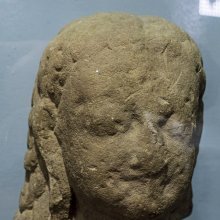Shirobhaga, Śirōbhāga, Śirobhāga: 5 definitions
Introduction:
Shirobhaga means something in Hinduism, Sanskrit, Marathi. If you want to know the exact meaning, history, etymology or English translation of this term then check out the descriptions on this page. Add your comment or reference to a book if you want to contribute to this summary article.
The Sanskrit terms Śirōbhāga and Śirobhāga can be transliterated into English as Sirobhaga or Shirobhaga, using the IAST transliteration scheme (?).
Images (photo gallery)
Languages of India and abroad
Marathi-English dictionary
Source: DDSA: The Molesworth Marathi and English Dictionaryśirōbhāga (शिरोभाग).—m (S) That division of the body which includes or which consists of the head. 2 fig. The head, chief, or principal of any multitude or body.
Source: DDSA: The Aryabhusan school dictionary, Marathi-Englishśirōbhāga (शिरोभाग).—m The head of any body.
Marathi is an Indo-European language having over 70 million native speakers people in (predominantly) Maharashtra India. Marathi, like many other Indo-Aryan languages, evolved from early forms of Prakrit, which itself is a subset of Sanskrit, one of the most ancient languages of the world.
Sanskrit dictionary
Source: Cologne Digital Sanskrit Dictionaries: Cappeller Sanskrit-English DictionaryŚirobhāga (शिरोभाग).—[masculine] head-end, top.
Source: Cologne Digital Sanskrit Dictionaries: Monier-Williams Sanskrit-English Dictionary1) Śirobhāga (शिरोभाग):—[=śiro-bhāga] [from śiro > śiras] m. the top (of a tree), [Kathāsaritsāgara]
2) [v.s. ...] the head-end (of a bed; also śayanīya-śiro-bh), [Kādambarī] ([varia lectio] ro-dhāman), [Harṣacarita]
[Sanskrit to German]
Sanskrit, also spelled संस्कृतम् (saṃskṛtam), is an ancient language of India commonly seen as the grandmother of the Indo-European language family (even English!). Closely allied with Prakrit and Pali, Sanskrit is more exhaustive in both grammar and terms and has the most extensive collection of literature in the world, greatly surpassing its sister-languages Greek and Latin.
See also (Relevant definitions)
Partial matches: Bhaga, Shiras.
Full-text: Anta.
Relevant text
No search results for Shirobhaga, Śirōbhāga, Śirobhāga, Sirobhaga, Shiro-bhaga, Śiro-bhāga, Siro-bhaga; (plurals include: Shirobhagas, Śirōbhāgas, Śirobhāgas, Sirobhagas, bhagas, bhāgas) in any book or story.
